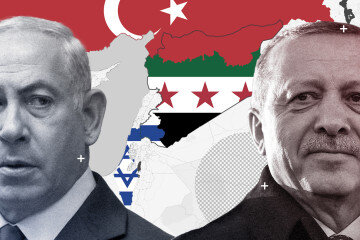Why is Washington seeking to break Turkey’s wings in Syria?

BEIRUT — The struggle between regional and international powers is raging in Syria. Ankara is among those powers seeking to strengthen its hegemony in Syria. This puts Turkey in a confrontation with Tel Aviv, which sees Turkish policy as a direct threat to its interests.
Over the past few weeks, the Israeli occupation entity has resumed its aggression against Syria with the aim of destroying all Syrian army installations in Hama, Palmyra, Dumayr, Homs, etc.
If the goal was to prevent Syria from retaining any military capabilities that could be used against it now or in the future, it would have accomplished this after the dramatic fall of Bashar al-Assad’s government and would not have left these sites untargeted until today.
Undoubtedly, there are technical and logistical reasons behind this delay. But the main reason, according to the confessions of the Zionist regime’s officials, is to prevent Turkey from utilizing these military bases – especially air bases.
Though Turkish foreign policy is largely focused on the trans-Atlantic alliance, the occupation entity is concerned about the presence of any Turkish military units in central or northern Syria, as they will restrict its air intervention in Syria.
A senior Israeli official had told Maariv that by strengthening its military and political presence in northern Syria, Ankara aims to “permanently consolidate its influence,” pointing out that “Turkish policies are not only limited to extending influence but also aim to undermine Israeli strategies in southern Syria.”
Israel believes that any Turkish military presence in Syria would provide Ankara with a wide influence over the Syrian authority, consolidating the influence that existed from the beginning of the war against the government of Bashar al-Assad until al-Jolani’s success in taking control of Syria.
For its part, Turkey has warned against Israeli intervention in Syria while taking measures that include consolidating its military presence even in central Syria, where there is talk of its intention to establish permanent military bases and deploy weapons and interceptor systems that would limit its freedom of maneuver in Syrian airspace — as Israeli security sources have warned.
As for al-Jolani, Israel considers him an integral part of Turkey’s tools to extend its influence in Syria, even if his positions do not pose a direct threat to Tel Aviv. This is why some Israeli officials have described him as a “leader of a terrorist organization.”
This, of course, allows the occupation entity to continue its expansionist strategies in southern Syria without paying attention to the reassuring messages it receives from al-Jolani – or through intermediaries – calling for finding “solutions” that take into account Israeli interests.
More importantly, Washington seeks to create a balance between its two competing regional allies. It supports Ankara in its attempts to extend its influence in northern Syria and a significant portion of the center but without extending to the Kurdish areas. At the same time, it takes into account Tel Aviv’s interests in the south to ensure the fragmentation of Syria.
Therefore, Washington is currently content to make sure that neither side is able to fully dominate Syria or monopolize its decision-making process. It did not take the initiative to lift sanctions on Syria; rather, it declared the new regime “terrorist” in line with the Israeli approach.
In a tacit message to block Turkish ambitions, Washington signaled to Moscow that it has no problem with the latter maintaining its military presence in Syria. It has also emphasized its support for the Kurds.
Overall, it is difficult to bet on the US position, which often combines contradictions, but it may give Ankara and Tel Aviv a greater opportunity to consolidate their influence.
Meanwhile, Turkish Foreign Minister Hakan Fidan told Reuters that Israeli attacks on Syria could deepen instability in the region, and that Syria’s willingness to enter into certain agreements with Israel is a purely internal Syrian matter.
Leave a Comment